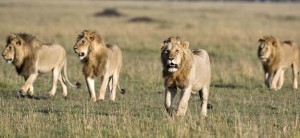3 Men Arrested for Poisoning Famous Pride of Lions in Kenya Face Life Imprisonment or Huge Fines
 Police in Kenya have arrested three Maasai herdsmen for poisoning a famous pride of lions in the Masai Mara Game Reserve.
Police in Kenya have arrested three Maasai herdsmen for poisoning a famous pride of lions in the Masai Mara Game Reserve.
The men reportedly poisoned the lions, which were featured on a popular BBC television documentary series “Big Cat Diary,” in retaliation for an attack on their livestock. The lions affectionately called the Marsh Pride allegedly attacked and killed two cows belonging to the herdsmen.
The incident reportedly happened over the weekend in western Kenya when the cows strayed into the reserve.
Kenya Wildlife Service (KLS) said on Tuesday that two lions from the Marsh Pride have died. They are suspected to have died of poisoning. Officials also suspect that the herdsmen targeted the lions with poisoned meat in retaliation.
KLS officials fear that the poisoned cow carcass which led to the deaths of the lions will have a ripple effect on the entire food chain.
Paula Kahumbu, a wildlife expert, says the treat of the poison spreading to other animals in the region is real. She says that at least six vultures were already found dead near the poisoned meat.
Kahumbu adds that other scavenging animals such as hyenas and jackals may also feed on the poisoned carcass too.
At least eight adult lions and a two-year-old cub are currently being treated for poisoning. BBC reports indicate that one of the lions, Bibi, a 17-year-old female, was found “foaming at the mouth, fitting and panting.”
The other dead lion was reportedly found disfigured after being eaten by hyenas.
Maasai herdsmen have poisoned lions in past, this practice is usually done in retaliation for attacks on their cows. The poison is apparently meant to stop the lions from attacking and eating their cattle.
Human-wildlife conflict has led to the steady decline of Kenya’s lions. There are reportedly about 2,000 lions left in the country. It is estimated that at least 100 lions are killed yearly.
The conflict between the lions and the Maasai herdsmen keeps recurring because the latter continues to enter the reserves to attack their cattle.
“Lions generally cannot coexist with humans, which is why protected areas are so vital. Sadly in Mara the pastoralists are entering the reserve nightly to graze livestock, so of course lions get killed,” Kahumbu said.
Kahumbu says the government must ban herdsmen from grazing their livestock in the reserves. If effectively enforced, this approach could conserve what’s left of Kenya’s lions.
She added that authorities must do more to protect the lions even as they leave the thinning park in search of food.
“The illegal nightly invasions of livestock have reduced much of the grassland to a virtual desert, so devoid of life that there were not even enough food for once common bird species such as kori bustards and black shouldered kites,” said Brian Jackman, a safari expert from whose book the famous pride was named.
Reports indicate that the three men face charges for poisoning the lions. If found guilty, the herdsmen face life imprisonment of pay a maximum fine of over $195,000.